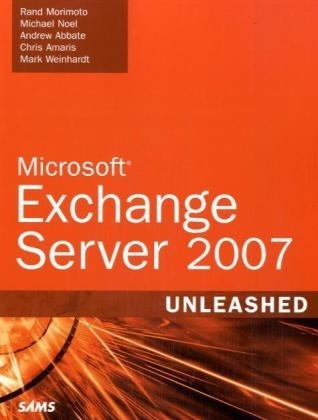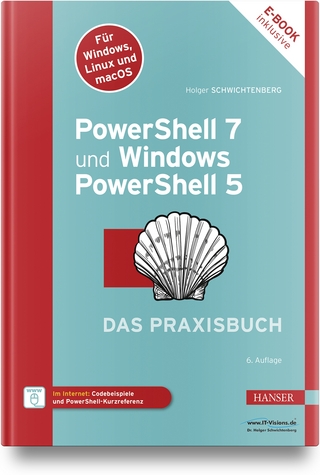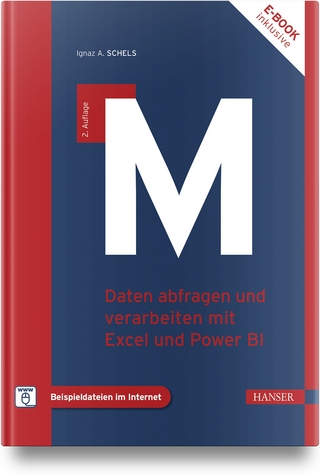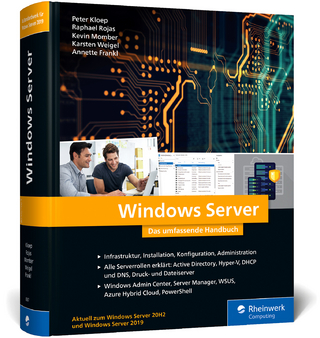
Microsoft Exchange Server 2007 Unleashed
Sams Publishing (Verlag)
978-0-672-32920-3 (ISBN)
- Titel ist leider vergriffen;
keine Neuauflage - Artikel merken
This is the ultimate guide to the design, migration, implementation, administration, management, and support of an Exchange Server 2007 environment. The recommendations, tips, and tricks covered are based on more than two years of early adopter implementations of Exchange 2007. The authors highlight the features and functions that organizations both large and small have found to be the important components in Exchange 2007, including the new Outlook Web Access mail, functions that better support mobile devices, server-to-server mailbox replication for better data recovery, and integrated voicemail unified messaging.
Detailed information on how to…
Plan your implementation and migration to Exchange 2007
Confirm that your architecture of Exchange 2007 meets best practices
Build a lab environment to test that your migration, implementation, and support processes are valid
Implement Cluster Continuous Replication for effective disaster recovery of a failed Exchange server or site
Integrate Exchange 2007 Unified Messaging into an existing telephony environment
Optimize Exchange 2007 for a scalable enterprise environment
Administer and support Exchange on an ongoing basis
Introduction
Part I Microsoft Exchange Server 2007 Overview
1 Exchange Server 2007 Technology Primer
2 Best Practices at Planning, Prototyping, Migrating, and Deploying Exchange Server 2007
Part II Planning and Designing an Exchange Server 2007 Environment
3 Understanding Core Exchange Server 2007 Design Plans
4 Architecting an Enterprise-Level Exchange Environment
5 Integrating Exchange Server 2007 in a Non-Windows Environment
6 Understanding Network Services and Active Directory Domain Controller Placement for Exchange Server 2007
Part III Implementing Exchange Server 2007 Services
7 Installing Exchange Server 2007
8 Implementing Edge Services for an Exchange Server 2007 Environment
9 Using the Windows PowerShell in an Exchange Server 2007 Environment
Part IV Securing an Exchange Server 2007 Environment
10 Client-Level Secured Messaging
11 Server and Transport-Level Security
12 Encrypting Email Communications with Exchange Server 2007
13 Securing Exchange Server 2007 with ISA Server
14 Understanding Enterprise Policy Enforcement Security
Part V Migrations and Coexistence with Exchange Server 2007
15 Migrating from Windows 2000 Server to Windows Server 2003
16 Migrating to Exchange Server 2007
17 Implementing Client Access and Hub Transport Servers
18 Administering an Exchange Server 2007 Environment
19 Exchange Server 2007 Management and Maintenance Practices
20 Using Microsoft Operations Manager to Monitor Exchange Server 2007
21 Using Terminal Services to Manage Exchange Servers
22 Documenting an Exchange Server 2007 Environment
Part VII Unified Communications in an Exchange Server 2007 Environment
23 Designing and Implementing Mobility in Exchange Server 2007
24 Designing and Configuring Unified Messaging in Exchange Server 2007
25 Collaborating Within an Exchange Environment Using Microsoft Office SharePoint Server 2007
26 Extending the Real-Time Communications Functionality of Exchange Server 2007
Part VIII Client Access to Exchange Server 2007
27 Getting the Most Out of the Microsoft Outlook Client
28 Leveraging the Capabilities of the Outlook Web Access (OWA) Client
29 Using Non-Windows Systems to Access Exchange Server 2007
30 Deploying the Client for Microsoft Exchange
Part IX Data Protection and Disaster Recovery of Exchange Server 2007
31 Continuous Backups, Clustering, and Network Load Balancing in Exchange Server 2007
32 Backing Up the Exchange Server 2007 Environment
33 Recovering from a Disaster in an Exchange Server 2007 Environment
Part X Optimizing Exchange Server 2007 Environments
34 Optimizing an Exchange Server 2007 Environment
35 Designing and Optimizing Storage (SAN/NAS) in an Exchange Server 2007 Environment
Index
Rand H. Morimoto, Ph.D., MBA, MCSE, MVP Rand Morimoto has been in the computer industry for more than 25 years and has authored, coauthored, or been a contributing writer for over a dozen books on Windows Server 2003, Security, Exchange Server 2003, BizTalk Server, and Remote and Mobile Computing. Rand is the president of Convergent Computing, an IT-consulting firm in the San Francisco Bay area that has been one of the key early adopter program partners with Microsoft, implementing beta versions of Microsoft Exchange Server 2007, SharePoint 2007, and Windows Longhorn Server in production environments more than 2 years before the initial product releases. Besides speaking at over 50 conferences and conventions around the world in the past year on tips, tricks, and best practices on planning, migrating, and implementing Exchange Server 2007, Rand is one of four cybersecurity advisors to the White House. Michael Noel, MCSE+I, CISSP, MCSA, MVP Michael Noel has been involved in the computer industry for nearly two decades, and has significant real-world experience with enterprise Exchange Server environments. Michael has authored several major publications such as Microsoft Exchange Server 2003 Unleashed, Microsoft ISA Server 2006 Unleashed, Microsoft SharePoint 2007 Unleashed, Microsoft Windows Server 2003 Unleashed, and many more with a total worldwide circulation of more than 100,000 copies. Currently a principal consultant at Convergent Computing in the San Francisco Bay area, Michael’s writings are leveraged from his real-world experience designing, deploying, and administering Exchange Server environments. Andrew Abbate, MCSE, MCSA Andrew Abbate is a 14-year veteran of consulting and IT with a wealth of practical knowledge on Exchange. Starting with his first migration of MS Mail to Exchange 4.0 through early adopter migrations to Exchange 2007, Andrew has worked with some of the largest and most complex Exchange environments in North America. In addition to his Exchange background, Andrew has written several other books covering topics such as Windows Server 2003, Active Directory, and Information Security. Andrew currently enjoys the position of Senior Consultant at Convergent Computing, where he continues to consult with both large and small clients to help improve their IT practices. Chris Amaris, MCSE, MVP, CISSP/ISSAP, CHS III Chris Amaris is the Chief Technology Officer and cofounder of Convergent Computing. He has more than 20 years experience consulting for Fortune 500 companies, leading companies in the technology selection, design, planning, and implementation of complex information technology projects. Chris has worked with Microsoft Exchange since the early beta days of version 4.0. He specializes in messaging, security, performance tuning, systems management, and migration. A Certified Information Systems Security Professional (CISSP) with an Information System Security Architecture Professional (ISSAP) concentration, Certified Homeland Security (CHS III), Windows 2003 MCSE, Novell CNE, Banyan CBE, and Certified Project Manager, Chris is also an author, writer, and technical editor for a number of IT books, including Network Security for Government and Corporate Executives, Microsoft Windows Server 2003 Unleashed, Microsoft Exchange Server 2003 Unleashed, and Microsoft Operations Manager 2005 Unleashed. Chris presents on messaging, operations management, security, and information technology topics worldwide. Mark Weinhardt, MCSE Mark Weinhardt has worked in various aspects of the computing industry for more than 20 years. Coming from a military background, Mark understands the importance of implementing and maintaining proper communications and has preserved that mentality with his transition to the private sector. Mark has been a consultant with Convergent Computing since 1994. With an infectious enthusiasm for technology, Mark has performed Windows and Exchange implementations and migrations for companies throughout northern California.
Introduction
Part I Microsoft Exchange Server 2007 Overview
1 Exchange Server 2007 Technology Primer
2 Best Practices at Planning, Prototyping, Migrating, and Deploying Exchange Server 2007
Part II Planning and Designing an Exchange Server 2007 Environment
3 Understanding Core Exchange Server 2007 Design Plans
4 Architecting an Enterprise-Level Exchange Environment
5 Integrating Exchange Server 2007 in a Non-Windows Environment
6 Understanding Network Services and Active Directory Domain Controller Placement for Exchange Server 2007
Part III Implementing Exchange Server 2007 Services
7 Installing Exchange Server 2007
8 Implementing Edge Services for an Exchange Server 2007 Environment
9 Using the Windows PowerShell in an Exchange Server 2007 Environment
Part IV Securing an Exchange Server 2007 Environment
10 Client-Level Secured Messaging
11 Server and Transport-Level Security
12 Encrypting Email Communications with Exchange Server 2007
13 Securing Exchange Server 2007 with ISA Server
14 Understanding Enterprise Policy Enforcement Security
Part V Migrations and Coexistence with Exchange Server 2007
15 Migrating from Windows 2000 Server to Windows Server 2003
16 Migrating to Exchange Server 2007
17 Implementing Client Access and Hub Transport Servers
18 Administering an Exchange Server 2007 Environment
19 Exchange Server 2007 Management and Maintenance Practices
20 Using Microsoft Operations Manager to Monitor Exchange Server 2007
21 Using Terminal Services to Manage Exchange Servers
22 Documenting an Exchange Server 2007 Environment
Part VII Unified Communications in an Exchange Server 2007 Environment
23 Designing and Implementing Mobility in Exchange Server 2007
24 Designing and Configuring Unified Messaging in Exchange Server 2007
25 Collaborating Within an Exchange Environment Using Microsoft Office SharePoint Server 2007
26 Extending the Real-Time Communications Functionality of Exchange Server 2007
Part VIII Client Access to Exchange Server 2007
27 Getting the Most Out of the Microsoft Outlook Client
28 Leveraging the Capabilities of the Outlook Web Access (OWA) Client
29 Using Non-Windows Systems to Access Exchange Server 2007
30 Deploying the Client for Microsoft Exchange
Part IX Data Protection and Disaster Recovery of Exchange Server 2007
31 Continuous Backups, Clustering, and Network Load Balancing in Exchange Server 2007
32 Backing Up the Exchange Server 2007 Environment
33 Recovering from a Disaster in an Exchange Server 2007 Environment
Part X Optimizing Exchange Server 2007 Environments
34 Optimizing an Exchange Server 2007 Environment
35 Designing and Optimizing Storage (SAN/NAS) in an Exchange Server 2007 Environment
Index
| Erscheint lt. Verlag | 19.2.2007 |
|---|---|
| Verlagsort | Indianapolis |
| Sprache | englisch |
| Maße | 176 x 233 mm |
| Gewicht | 2036 g |
| Themenwelt | Informatik ► Betriebssysteme / Server ► Windows |
| Informatik ► Betriebssysteme / Server ► Windows Server | |
| Mathematik / Informatik ► Informatik ► Netzwerke | |
| ISBN-10 | 0-672-32920-4 / 0672329204 |
| ISBN-13 | 978-0-672-32920-3 / 9780672329203 |
| Zustand | Neuware |
| Haben Sie eine Frage zum Produkt? |
aus dem Bereich


